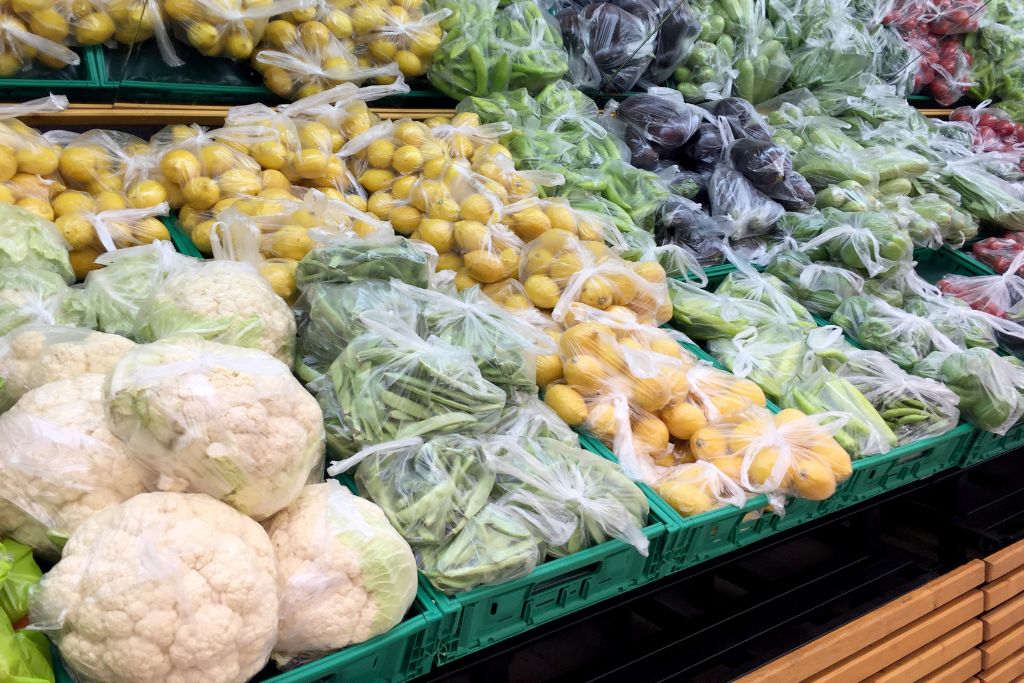The new EU-wide packaging targets include a reduction of 5% by 2030 and 15% by 2040, while all packaging is expected to be fully recyclable by decade’s end. The targets as a whole will not apply to very small businesses.
—
The European Parliament’s representatives and Belgium, which currently holds the Council’s presidency, reached a deal on Monday aimed at tackling the increase in packaging waste generated in the European Union.
The provisional agreement, pending adoption by both institutions, effectively strengthens existing bloc-wide sustainability and recycling requirements and covers the full life cycle of packaging in a bid to tackle the EU’s mounting piles of packaging waste driven by online shopping and the rise of takeaway culture.
In 2021, EU countries generated 84 million tonnes of packaging waste, which represented approximately one-third of all municipal solid waste, with paper and cardboard accounting for the largest share – 34 million tonnes. On average, this translates to over 188 kilograms of packaging waste per capita, the equivalent of half a kilo of packaging per person per day. While bloc-wide waste from packaging in 2021 was already 24% higher than in 2010, projections indicate that this could increase by a further 19% by the end of the decade if no action is taken.
In order to achieve the packaging reduction targets of 5% by 2030 and 15% by 2040 agreed upon on Monday, the new legislation addresses single-use plastics and introduces new requirements to promote reutilisation and recycling of packaging.
Starting from January 1, 3020, certain packaging formats will be banned. These include single-use plastic packaging for unprocessed fruit and vegetables, packaging for food and beverages filled and consumed in cafés and restaurants, individual portions of condiments, sauces, and sugar as well as mini hotel cosmetic and toiletry products, shrink-wrap for suitcases in airports, and lightweight plastic bags.
The provisional legislation maintains previous targets for recycled content in plastic packaging, aiming to make packaging fully recyclable by 2030. Very small businesses are exempted from these targets.
The text also sets new binding re-use targets. At least 10% of packaging for alcoholic and non-alcoholic beverages, for example, will have to be reusable by 2030, with the exception of milk, wine, and spirits. Businesses offering take-away foods and drinks will also have to adhere to offering at least 10% of products in a reusable packaging format by decade’s end and will be required to offer customers the option of bringing their own container.
By 2029, bloc members will be required to set up a deposit return system (DRS) of at least 90% of single-use plastic bottles and cans per year. 10 European countries have so far implemented deposit refund schemes, with return rates ranging between 82% in Estonia and 97% to 98.4% in Norway and Germany. Countries that can achieve a separate collection rate of above 80% by 2025 and submit an implementation plan for achieving the 90% target will be excepted from the DRS requirement.
“For the first time in an environmental law, the EU is setting targets to reduce packaging consumption, regardless of the material used. We call on all industrial sectors, EU countries and consumers to play their part in the fight against excess packaging,” said rapporteur Frédérique Ries, the lawmaker leading work on the file for the European Parliament.
Among the new requirements is a ban on per-and polyfluoroalkyl substances (PFAS) – also known as forever chemicals – in food contact packaging, in what Ries called “a great victory for the health of European consumers.”
PFAS include more than 12,000 heat-resistant, oil-resistant, and water-resistant chemicals first introduced in the 1930s and found in hundreds of products including stain- and water-resistant fabrics and carpeting, makeup, cleaning products, paints, and fire-fighting foams, which can stay in human bodies for years and affect almost every organ system, leading to severe diseases including cancers, high cholesterol, thyroid disease, digestive issues, liver damage, asthma, allergies, and reduced vaccine response in children.
Last month, a dozen EU leaders, including former climate chief Frans Timmermans and current environment commissioner Virginijus Sinkevičious, called for a Europe-wide ban on the use of these toxic chemicals after testing positive for these cancerous pollutants as part of an awareness campaign.
You might also like: New ‘Ambitious’ EU Legislation to Combat Environmental Crimes Introduces Tougher Penalties for Polluting Companies’ Representatives


















